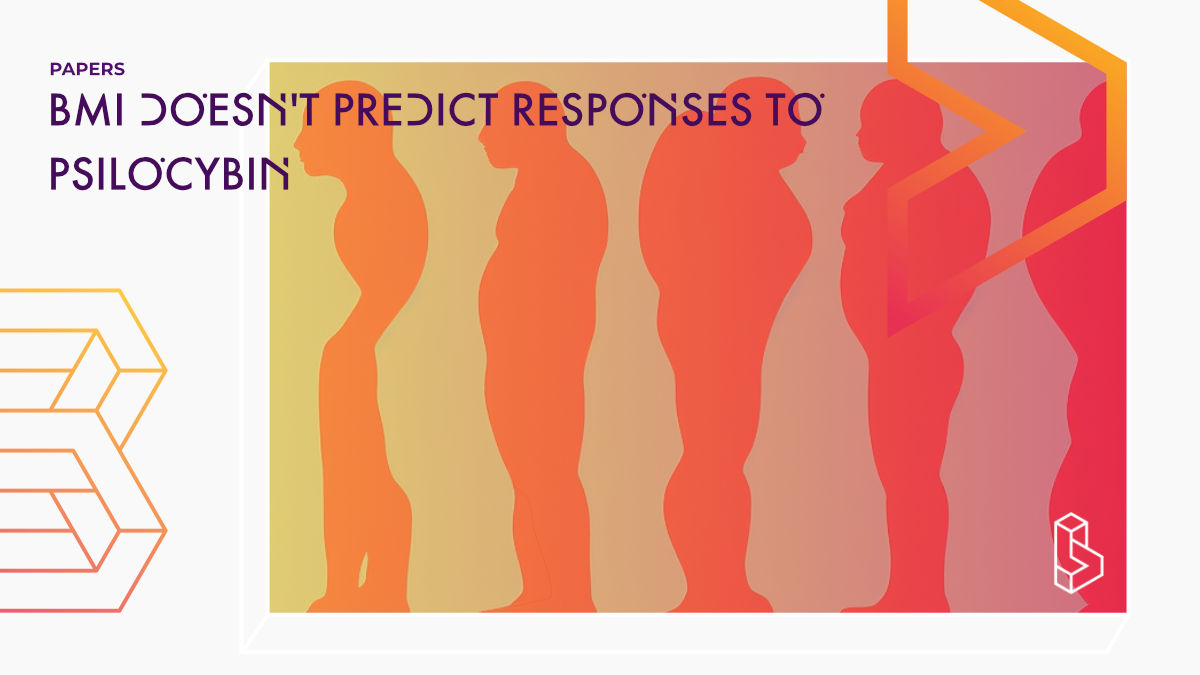This pooled analysis (n=77) of body mass index (BMI) data from three psilocybin (25mg) trials finds that BMI doesn’t predict the intensity of the response to psilocybin. A fixed-dosing schedule (instead of dosage based on weight which is common for MDMA and ketamine) is probably best going forward in psilocybin-assisted trials.
Abstract
“Background: Psilocybin is a serotonin type 2A (5-HT2A) receptor agonist and naturally occurring psychedelic. 5-HT2A receptor density is known to be associated with body mass index (BMI), however, the impact of this on psilocybin therapy has not been explored. While body weight-adjusted dosing is widely used, this imposes a practical and financial strain on the scalability of psychedelic therapy. This gap between evidence and practice is caused by the absence of studies clarifying the relationship between BMI, the acute psychedelic experience and long-term psychological outcomes.
Method: Data were pooled across three studies using a fixed 25 mg dose of psilocybin delivered in a therapeutic context to assess whether BMI predicts characteristics of the acute experience and changes in well-being 2 weeks later. Supplementing frequentist analysis with Bayes Factors has enabled for conclusions to be drawn regarding the null hypothesis.
Results: Results support the null hypothesis that BMI does not predict overall intensity of the altered state, mystical experiences, perceptual changes or emotional breakthroughs during the acute experience. There was weak evidence for greater ‘dread of ego dissolution’ in participants with lower BMI, however, further analysis suggested BMI did not meaningfully add to the combination of the other covariates (age, sex and study). While mystical-type experiences and emotional breakthroughs were strong predictors of improvements in well-being, BMI was not.
Conclusions: These findings have important implications for our understanding of pharmacological and extra-pharmacological contributors to psychedelic-assisted therapy and for the standardization of a fixed therapeutic dose in psychedelic-assisted therapy.“
Authors: Meg J. Spriggs, Bruna Giribaldi, Taylor Lyons, Fernando E. Rosas, Laura S. Kärtner, Tobias Buchborn, Hannah M. Douglass, Leor Roseman, Christopher Timmermann, David Erritzoe, David J. Nutt & Robin L. Carhart-Harris
Summary of BMI doesn’t predict responses to psilocybin
Psilocybin-assisted therapy is making a resurgence in psychiatry, with greater plasma psilocin and 5-HT2A receptor occupancy being associated with a greater intensity of subjective effects. However, there is currently no data on how the relationship between 5-HT2A receptor expression and acute experience translates into long-term outcomes.
5-HT2A receptor density in the brain varies across individuals based on clinical and demographic factors, including body mass index (BMI). A high-fat diet is associated with a greater density of 5-HT2A receptors in the brain, while a reduction in 5-HT2A receptor density has been demonstrated in patients with eating disorders.
Find this paper
Body mass index (BMI) does not predict responses to psilocybin
https://doi.org/10.1177/02698811221131994
Open Access | Google Scholar | Backup | 🕊
Authors
Authors associated with this publication with profiles on Blossom
Taylor LyonsTaylor Lyons is completing her PhD at Imperial College London by investigating the acute and long-term effects of psilocybin on the brain (in healthy naïve subjects).
Leor Roseman
Leor Roseman is a researcher at the Centre for Psychedelic Research, Imperial College London. His work focussed on psilocybin for depression, but is now related to peace-building through psychedelics.
Chris Timmermann
Chris Timmerman is a postdoc at Imperial College London. His research is mostly focussed on DMT.
David Erritzoe
David Erritzoe is the clinical director of the Centre for Psychedelic Research at Imperial College London. His work focuses on brain imaging (PET/(f)MRI).
David Nutt
David John Nutt is a great advocate for looking at drugs and their harm objectively and scientifically. This got him dismissed as ACMD (Advisory Council on the Misuse of Drugs) chairman.
Robin Carhart-Harris
Dr. Robin Carhart-Harris is the Founding Director of the Neuroscape Psychedelics Division at UCSF. Previously he led the Psychedelic group at Imperial College London.
Institutes
Institutes associated with this publication
Imperial College LondonThe Centre for Psychedelic Research studies the action (in the brain) and clinical use of psychedelics, with a focus on depression.
Compound Details
The psychedelics given at which dose and how many times
Psilocybin 25 mg | 1xLinked Research Papers
Notable research papers that build on or are influenced by this paper
Prediction of psilocybin response in healthy volunteersThis pooled-data study (n=409) looks at the non-pharmacological influences on the psychedelic experience. This includes the current mood state, drug pre-experiences, expectancies, and social and environmental variables. The drug dosage, personality trait absorption, and being emotionally excitable were the top predictors of pleasant and peak/mystical experiences.
Optimal dosing for psilocybin pharmacotherapy: Considering weight-adjusted and fixed dosing approaches
This analysis of psilocybin dosages given in 10 previous studies (n=288) found no effect of weight, nor gender, on the effects (acute or long-term) of the dosage (20-30mg) of psilocybin used. The authors recommend a fixed dosing approach going forward to simplify dosing regimes.
Linked Clinical Trial
Assessing the subjective intensity of oral psilocybin in patients with treatment-resistant depression: A Pilot Study (PSILODEP-PILOT)This open-label trial (n=12), also known as PSILODEP-PILOT is the first to test psilocybin in patients in the UK. The study found psilocybin (10-25mg, x2) to be well-tolerated.
Psilocybin vs Escitalopram for Major Depressive Disorder: Comparative Mechanisms
This is a randomised double-blind clinical trial. The aim is to compare the efficacy and mechanisms of action of psilocybin, the primary psychoactive substance in 'magic mushrooms', with the SSRI (selective serotonin reuptake inhibitor) escitalopram for major depressive disorder (MDD).

